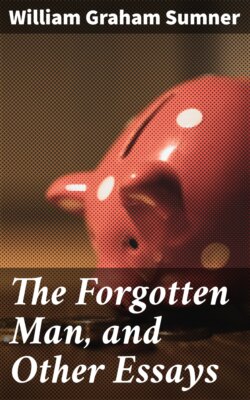Читать книгу The Forgotten Man, and Other Essays - William Graham Sumner - Страница 18
На сайте Литреса книга снята с продажи.
(D) Examination of the Plan of Mutual Taxation.
Оглавление32. Suppose then that the industries and sections all begin to tax each other as we see that they do under protection. Is it not plain that the taxing operation can do nothing but transfer products, never by any possibility create them? The object of the protective taxes is to “effect the diversion of a part of the capital and labor of the country from the channels in which it would run otherwise.” To do this it must find a fulcrum or point of reaction, or it can exert no force for the effect it desires. The fulcrum is furnished by those who pay the tax. Take a case. Pennsylvania taxes New England on every ton of iron and coal used in its industries. Ohio taxes New England on all the wool obtained from that state for its industries.4 New England taxes Ohio and Pennsylvania on all the cottons and woolens which it sells to them. What is the net final result? It is mathematically certain that the only result can be that (1) New England gets back just all she paid (in which case the system is nil, save for the expense of the process and the limitation it imposes on the industry of all), or, (2) that New England does not get back as much as she paid (in which case she is tributary to the others), or, (3) that she gets back more than she paid (in which case she levies tribute on them). Yet, on the protectionist notion, this system extended to all sections, and embracing all industries, is the means of producing national prosperity. When it is all done, what does it amount to except that all Americans must support all Americans? How can they do it better than for each to support himself to the best of his ability? Then, however, all the assumptions of protectionism must be abandoned as false.
33. In 1676 King Charles II granted to his natural son, the Duke of Richmond, a tax of a shilling a chaldron on all the coal which was exported from the Tyne. We regard such a grant as a shocking abuse of the taxing power. It is, however, a very interesting case because the mine owner and the tax owner were two separate persons, and the tax can be examined in all its separate iniquity. If, as I suppose was the case, the Tyne Valley possessed such superior facilities for producing coal that it had a qualified monopoly, the tax fell on the coal mine owner (landlord); that is, the king transferred to his son part of the property which belonged to the Tyne coal owners. In that view the case may come home to some of our protectionists as it would not if the tax had fallen on the consumers. If Congress had pensioned General Grant by giving him seventy-five cents a ton on all the coal mined in the Lehigh Valley, what protests we should have heard from the owners of coal lands in that district! If the king’s son, however, had owned the coal mines, and worked them himself, and if the king had said: “I will authorize you to raise the price of your coal a shilling a chaldron, and, to enable you to do it, I will myself tax all coal but yours a shilling a chaldron,” then the device would have been modern and enlightened and American. We have done just that on emery, copper, and nickel. Then the tax comes out of the consumer. Then it is not, according to the protectionist, harmful, but the key to national prosperity, the thing which corrects the errors of our incompetent self-will, and leads us up to better organization of our industry than we, in our unguided stupidity, could have made.
